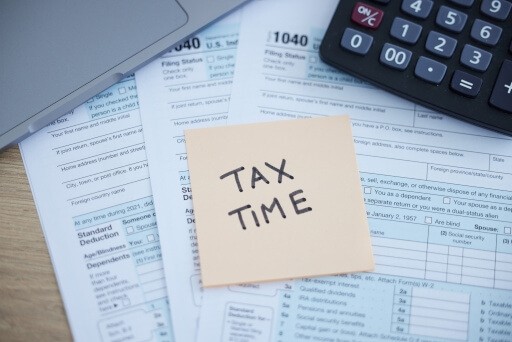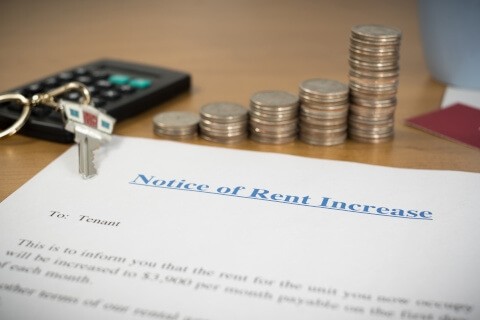
Like any investment, rental properties come with some financial risk. However, with this risk also comes fiscal reward – especially during tax season.
Owning and managing a rental property, when done correctly, can yield many tax benefits for landlords. However, to fully reap the rewards, it’s important to understand what classifies rental property tax deductions, how to keep track of them and other helpful tips for maximizing tax benefits.
In this article, we’ll discuss the top tax benefits of a rental property and how to take advantage of them this upcoming tax season. Here’s a quick look at what we’ll cover:
- What are common rental property tax deductions?
- Which rental expenses are not tax deductible?
- What is mortgage interest deduction?
- What is rental property depreciation?
- What other benefits should landlords consider during tax season?
What Are “Ordinary and Necessary” Expense Deductions?
Rental property expenses come with the territory of being a landlord. While you aren’t the one living in the property, you are responsible for managing property upkeep and ensuring a safe, habitable living experience for tenants. These responsibilities incur costs, but, luckily for you, many of these expenses can be written off when it’s time to file taxes.
The U.S. Internal Revenue Service (IRS) states landlords can “deduct the ordinary and necessary expenses for managing, conserving, and maintaining your rental property.” This means that any rental property expense that is integral to your property’s livability and overall condition can be deducted from your taxable income.
Some of these deductible rental expenses include:
- Mortgage interest
- Property tax
- Depreciation
- Repair and maintenance costs
- Operating expenses, i.e. marketing services, employee salaries (contractors), pest control, utilities, cleaning services, HOA fees, etc.
Regardless of your property type, anticipate incurring some variation of the above-listed expenses when you invest in a rental property. As you acquire these costs, make sure to keep a detailed, running list so you can accurately report them on your annual tax return. You can do this by hand or utilizing an efficient online platform like Apartments.com.
Tracking operating expenses with Apartments.com makes tax season a lot less daunting. Our user-friendly Rental Income and Expense Tracking Platform allows you to stay on top of rental expenses right until the day you file. Not only can you report costs, but you can also assign each expense to a tax category. Then, once it comes time to file taxes, you can easily export your expenses into a spreadsheet or PDF, streamlining the process for you or your tax professional.
What Rental Expenses Are Not Tax Deductible?
Not every rental property expense is deductible. For example, you may decide to renovate your rental property when your tenant’s lease is up. Though this will improve your property market value and, as a result, your rental income, you won’t be able to deduct renovation costs from your taxable income. According to the IRS, the cost of improvements “is recovered through depreciation,” which we’ll explore later in this article.
In addition to property improvements, here are some other common rental expenses ineligible for deductions:
- Personal expenses (ex., stocking the kitchen while temporarily staying at the property)
- Expenses during vacancy (ex., mortgage interest or advertising costs while the property is unoccupied)
- Travel costs (ex., gas to travel to and from the rental property)
- Fines and penalties (ex., a disciplinary charge for breaking HOA guidelines)
What Is a Mortgage Interest Deduction?
If you took out a mortgage when buying your rental property, you can take advantage of one of the most valuable tax benefits available to landlords: the mortgage interest deduction.
The IRS permits landlords to deduct interest on up to $750,000 of secured mortgage debt on primary and secondary residences. For rental properties purchased before December 16, 2017, the deduction limit increases to $1 million. It’s important to note that this deduction only applies to interest payments, not principal loan repayments. These charges should be easy to identify when you receive an IRS Form 1098 from your mortgage company, which will showcase your total interest payment for the year.
Along with mortgage interest, you can also deduct credit card interest for expenses directly tied to your rental property. This includes interest on unsecured loans used for property improvements, as well as origination fees, points, or refinancing costs associated with the property's purchase.
Rental Property Depreciation: What It Is and Why It Matters for Tax Deductions
Rental property depreciation is another primary tax deduction for landlords. This pertains to the gradual decrease in the value of your rental property over time. You might argue that you’ve maintained your property’s value with diligent upkeep and maintenance. However, the average residential rental property depreciates at 3.6% each year over 27.5 years, otherwise known as its “useful life,” according to a recent article by Investopedia. That said, it’s safe to assume slight property depreciation, even with consistent upkeep.
So why does depreciation matter? The IRS categorizes depreciation as an “ordinary or necessary expense,” meaning you can deduct the cost of property depreciation from your taxable rental income. However, to qualify for a depreciation deduction, you must meet the following requirements:
- You own the property.
- The property is used in your business or to generate income.
- It has a measurable useful life, meaning it deteriorates, wears out, becomes obsolete, or loses value over time due to natural causes.
- You expect it to remain functional for more than one year.
- The property was not both put into service and disposed of (or removed from business use) within the same year.
To calculate your rental property depreciation, you must first determine its “useful life.” This can be done using one of two systems: the General Depreciation System (GDS) or the Alternative Depreciation System (ADS). The GDS is the universal option for most residential properties, while ADS is utilized for special circumstances. Here’s an overview of each option:
General Depreciation System (GDS):
- Applicable use life for residential properties: 27.5 years
- Features a shorter recovery period
- The most commonly used method, spreading depreciation evenly across the rental property's useful life
Alternative Depreciation System (ADS):
- Applicable use life for residential properties: 30 years (or 40 years for properties placed in service before January 1, 2018)
- Involves longer recovery periods
- Allows for higher annual depreciation claims
Once you’ve selected a system, the calculation is simple. Take your property value (excluding land value) and divide it by your residential useful life. Let’s say you purchased a home to rent for $500,000, and its land value is $100,000. To calculate depreciation, subtract your land value from your purchase price ($500,000 - $100,000 = $400,000), then take that value and divide it by the useful life. If you’re using the GDS, that’d be $400,000/27.5, meaning your depreciation value is about $14,545.
Other Tax Benefits to Consider
In addition to the mortgage interest, depreciation, and other deductions we’ve discussed, there are some other tax benefits for landlords to consider. When investing in a rental property, here are some other tax benefits to keep in mind:
Capital gains tax deferral
Another huge tax benefit of a rental property is the ability to defer paying capital gains tax. This can be done through IRS 1031 exchange, which allows you to postpone tax payments on a capital gain if you reinvest the earnings into a similar asset within a specified time frame. In simpler terms, you can sell your rental property and use the proceeds to purchase another investment or rental property without immediately owing taxes on the profits. This is especially beneficial if you want to expand your rental portfolio or upgrade to a more profitable investment.
Avoiding FICA taxes
FICA taxes, in relation to the Federal Insurance Contributions Act, are something you may be familiar with if you’ve ever been on someone’s payroll. FICA taxes deduct a certain percentage of your earned income to fund Social Security and Medicare programs. However, if your rental income is your only revenue stream, you won’t have to worry about FICA taxes. This is because rental income is categorized differently than earned income, meaning it is not subject to FICA taxation. This is yet another way owning a rental property can save you money during tax season.
Manage Rental Expenses with Apartments.com
Tax season can be a headache for even the most seasoned landlords, especially if rental income and expenses aren’t well-organized. Without a clear record of what you’ve invested in your property, it’s nearly impossible to report your deductions accurately. To prevent financial loss and simplify the tax filing process, try tracking expenses with Apartments.com. Our user-friendly Expense Tracking Platform makes it easy to record expenses and have them ready for when it’s time to file. Get started with us today and discover how stress-free tax season can be!
FAQ
How is rental income taxed?
Rental income is taxed as part of your overall income. You’ll need to report it on your tax return, and it may be subject to federal, state, and local taxes depending on where you live.
Is property tax deductible?
Yes, property taxes are generally deductible on your tax return. You can usually claim this deduction as part of your itemized deductions if you own the property and it’s used for personal or rental purposes.
The above information is in no way intended to be a substitute for qualified legal advice. Please conduct your own research and comply with all your state and local laws. If you need tax advice, please contact a tax professional or real estate lawyer in your area.











